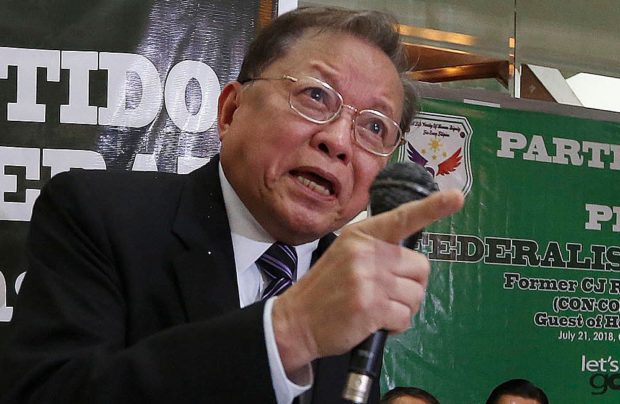
MANILA, Philippines — Retired chief justice Reynato Puno has urged the House of Representatives to refrain from using the term “unless provided by law” in amending the 1987 Constitution’s economic provisions, saying that the items in question should be repealed instead.
Puno on Monday, at the House committee of the whole’s hearings on Resolution of Both Houses (RBH) No. 7, explained that amendments made through legislation — or enacted bills that would specify how much foreign businesses can own in the industries that would be opened — may be questioned for its constitutionality.
He pointed out that all of the country’s Constitutions have explicitly stated that changes in the Constitution should come by way of referendum or with the people’s approval.
“The use of the phrase ‘unless otherwise provided by law’ is vulnerable to another constitutional challenge. Number one, your Honors, allowing Congress to use its lawmaking powers to amend the Constitution may be questionable. Number two, the laws that will be passed by Congress for this purpose will not be approved by the people in a proper referendum,” Puno told lawmakers.
“Under all our Constitutions —1935 Constitution, 1973 Constitution and especially under the 1987 Constitution — any and all changes in the constitution, whether they come from a constitutional convention, whether they come from a Constitutional assembly, or whether they come from a people’s initiative have to be approved by the people in what is known as an obligatory referendum,” he added.
Under RBH No. 7 and the Senate’s RBH No. 6 — which the House-version was mirrored from — three parts of the 1987 Constitution would be amended by inserting the phrase ‘unless provided by law’:
- Section 11 of Article XII (National Patrimony and Economy), where the phrase “unless provided by law” is inserted in the provision that bars foreign ownership of a public utility shall except in a case where 60 percent of the total capital belongs to Filipino citizens.
- Section 4 of Article XIV (Education, Science and Technology, Arts, Culture, and Sports) where the phrase “unless provided by law” is inserted in the provision that bars foreign ownership of basic educational institutions except in a case where 60 percent of the total capital belongs to Filipino citizens.
- Section 11 of Article XVI (General Provisions) where the phrase “unless provided by law” is inserted in two portions: first, the provision that bars foreign ownership in the advertising industry except in a case where 70 percent of the total capital belongs to Filipino citizens; and in the provision that limits foreign investors participation in entities to how much their capital share is
Placing the phrase would allow Congress to craft bills that would set guidelines on how much foreign entities can own — thereby placing the decision on how liberalized the said industries are on the legislature.
But instead of taking this route, Puno suggested that these three provisions in the 1987 Constitution be repealed — including Article II Section 19 which requires the Philippine economy to be effectively controlled by Filipinos.
“Just repeal these three restrictive provisions of the Constitution, which we want to be out. And in addition, you just repeal Article II Section 19 of the 1987 Constitution which states ‘the state shall develop a self-reliant and independent national economy effectively controlled by Filipinos’. Include that in the repeal,” Puno said.
“If all those provisions will be repealed, then Congress in the exercise of its lawmaking power can enact all the necessary laws in order to attract these foreign investments. By the repeal of all those provisions, you let go the power, the lawmaking power of Congress. That is, to me, how simple that is,” he added.
But Marikina 2nd District Rep. Stella Quimbo who has supported proposals to amend the Constitution noted that the term “unless provided by law” was placed because lawmakers want to avoid making mistakes in amending the Constitution — as amending the charter again would take time and effort.